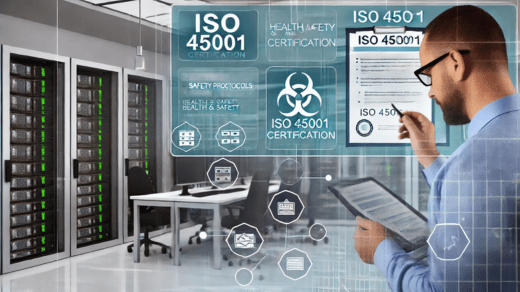How ISO Certifications Drive Small Business Success

ISO certifications—such as ISO 9001 (Quality Management System – QMS), ISO 14001 (Environmental Management System – EMS), ISO 27001 (Information Security Management System – ISMS), ISO 22000 (Food Safety Management System – FSMS), and ISO 45001 (Occupational Health and Safety – OH&S)—offer small businesses a strategic advantage. These international standards help companies improve quality, reduce risks, protect data, ensure safety, and enhance sustainability. Implementing these certifications not only boosts operational efficiency but also builds credibility and trust with customers, partners, and regulators. By adopting an integrated approach, small businesses can further streamline processes, reduce implementation costs, and maximize benefits. This article highlights the key advantages of each certification and demonstrates how integration can simplify the process.
ISO 9001: Quality Management System (QMS)
ISO 9001 is a global standard that provides a framework for establishing a Quality Management System (QMS). For small businesses, ISO 9001 certification ensures that products or services consistently meet customer expectations while reducing inefficiencies and improving process control. By focusing on continuous improvement, ISO 9001 helps businesses enhance performance and customer satisfaction.
Example: A small software development company can implement ISO 9001 to standardize its project management and coding processes. This reduces bugs in the final software, ensures timely delivery, and improves client satisfaction, leading to repeat business.
ISO 9001 certification also helps the business demonstrate its commitment to quality, which can be a powerful selling point when competing for contracts with larger companies that require certified suppliers.
ISO 14001: Environmental Management System (EMS)
ISO 14001 provides businesses with a framework for managing their environmental responsibilities through an Environmental Management System (EMS). For small businesses, adopting ISO 14001 demonstrates a commitment to sustainability, which can improve market reputation and lead to cost savings by reducing waste and energy use.
Example: A small retail business implements ISO 14001 by reducing its energy consumption and adopting a recycling program for packaging waste. These measures help the company lower its operating costs while appealing to environmentally conscious customers.
ISO 14001 certification enhances the business’s credibility in today’s eco-conscious marketplace, enabling it to attract more customers and even collaborate with larger corporations that prioritize sustainability in their supply chains.
ISO 27001: Information Security Management System (ISMS)
ISO 27001 outlines the requirements for an Information Security Management System (ISMS) that helps businesses protect sensitive data from cyber threats and breaches. For small businesses, ISO 27001 certification ensures that data protection measures are in place, which can be crucial when dealing with larger clients or sensitive information.
Example: A small marketing agency uses ISO 27001 to safeguard client data, including customer information and proprietary marketing strategies. A professional IT administrator can help you design your system. This certification ensures that only authorized personnel can access the data, and that backup procedures are regularly tested.
By obtaining ISO 27001 certification, the agency demonstrates that it takes data security seriously, which builds trust with clients and distinguishes it from competitors that may not have such robust security measures.
ISO 22000: Food Safety Management System (FSMS)
ISO 22000 specifies the requirements for a Food Safety Management System (FSMS) that helps businesses in the food industry manage food safety hazards and ensure the safety of their products. For small businesses in the food supply chain, ISO 22000 certification can be a critical step toward gaining customer trust and meeting regulatory requirements.
Example: A small dairy company uses ISO 22000 to implement strict hygiene controls and temperature monitoring systems throughout its production and distribution processes. This ensures that its products meet food safety standards and reduces the risk of contamination.
ISO 22000 certification enables the company to demonstrate its commitment to food safety, allowing it to build stronger relationships with distributors and retailers while minimizing the risk of costly recalls or regulatory penalties.
ISO 45001: Occupational Health and Safety (OH&S)
ISO 45001 is designed to help businesses create a safe and healthy work environment through an Occupational Health and Safety (OH&S) management system. For small businesses, especially those in high-risk industries, ISO 45001 certification can reduce workplace accidents, improve employee morale, and ensure compliance with health and safety regulations.
Example: A small construction company adopts ISO 45001 OH&S by establishing clear safety protocols, conducting regular safety training sessions for employees, and implementing risk assessments before starting new projects. These measures help the company prevent accidents and reduce downtime due to injuries.
ISO 45001 certification not only boosts the company’s reputation for safety but also reduces insurance costs and makes it more competitive when bidding for contracts that prioritize safety-conscious partners.
Integrating ISO Management Systems for Maximum Efficiency
Small businesses can further optimize the benefits of ISO certifications by adopting an Integrated Management System (IMS). Many ISO standards, such as ISO 9001, ISO 14001, ISO 27001, ISO 22000, and ISO 45001, share similar elements like risk management, document control, and internal audits. By combining these systems into one cohesive framework, businesses can reduce duplication, streamline processes, and save on implementation and maintenance costs.
An integrated approach allows small businesses to conduct a single audit that covers multiple certifications, reducing the time and effort required to maintain compliance. This also makes it easier to train staff, as employees only need to be familiar with one set of procedures that apply across all areas of the business.
Example of an Integrated System
A small manufacturing company could implement an Integrated Management System that combines ISO 9001 (QMS) for quality management, ISO 14001 (EMS) for environmental responsibility, and ISO 45001 (OH&S) for worker safety. By doing so, the company can streamline its procedures for audits, corrective actions, and risk management, which saves time and reduces administrative costs.
This integrated system also improves overall performance, as employees work within a unified framework that addresses quality, environmental impact, and safety in a cohesive manner. This approach helps the company meet customer expectations, comply with regulations, and build a strong brand image as a responsible and reliable business.
Conclusion
ISO certifications such as ISO 9001, ISO 14001, ISO 27001, ISO 22000, and ISO 45001 offer small businesses a wide range of benefits, from improving quality and efficiency to enhancing data security, food safety, and worker safety. These certifications not only help businesses stay compliant with industry regulations but also build trust with customers, partners, and stakeholders.
By integrating these certifications into a single management system, small businesses can further streamline their operations, reduce costs, and simplify compliance efforts. This integrated approach allows businesses to focus on growth and innovation while maintaining high standards across all areas of operation.
In a competitive marketplace, ISO certifications provide small businesses with the tools they need to succeed, ensuring long-term sustainability, improved customer satisfaction, and the ability to meet the evolving demands of today’s consumers and regulators.




